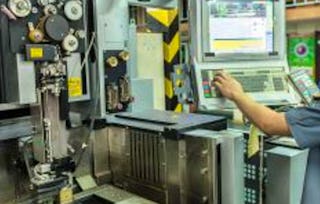Manufacturers are increasingly utilizing machine tools that are self-aware – they perceive their own states and the state of the surrounding environment – and are able to make decisions related to machine activity processes. This is called intelligent machining, and through this course students will receive a primer on its background, tools and related terminology.


Intelligent Machining

Intelligent Machining
This course is part of Digital Manufacturing & Design Technology Specialization

Instructor: Rahul Rai
32,618 already enrolled
Included with
1,387 reviews
Skills you'll gain
- Digital Transformation
- Manufacturing Operations
- Control Systems
- Artificial Intelligence
- Systems Architecture
- Industrial Engineering
- Manufacturing Processes
- Automation
- Machine Controls
- Software Systems
- Process Control
- Digital Signal Processing
- Programmable Logic Controllers
- Manufacturing and Production
- Skills section collapsed. Showing 9 of 14 skills.
Details to know

Add to your LinkedIn profile
16 assignments
See how employees at top companies are mastering in-demand skills

Build your subject-matter expertise
- Learn new concepts from industry experts
- Gain a foundational understanding of a subject or tool
- Develop job-relevant skills with hands-on projects
- Earn a shareable career certificate

There are 4 modules in this course
The purpose of this module is to introduce the concepts related to intelligent machining paradigm. The key focus will be discussing two key components of intelligent machining, i.e., sensing and control.
What's included
4 videos4 readings4 assignments
The purpose of this module is to introduce spectrum of sensors used to implement intelligent machining. The module will also discuss the basics of signal processing and analysis techniques that has brought intelligent machining paradigm closer to industrial realization. Following issues pertaining to sensors and sensing techniques will be elaborated up: (1) Which sensors are to be used in each application? (2) How to acquire and process sensor signals?
What's included
4 videos3 readings5 assignments1 discussion prompt
The purpose of this module is to introduce the concept of Programmable Logic Controllers (PLCs) that co-ordinate the real-time control functions.
What's included
4 videos4 readings5 assignments
The purpose of this module is to introduce the background related to open architecture software systems to implement intelligent machining.
What's included
3 videos5 readings2 assignments1 discussion prompt
Earn a career certificate
Add this credential to your LinkedIn profile, resume, or CV. Share it on social media and in your performance review.
Instructor

Explore more from Mechanical Engineering
 Status: Free Trial
Status: Free Trial Status: Free Trial
Status: Free Trial Status: Free Trial
Status: Free TrialBoard Infinity
 Status: Free Trial
Status: Free TrialL&T EduTech
Why people choose Coursera for their career

Felipe M.

Jennifer J.

Larry W.

Chaitanya A.
Learner reviews
- 5 stars
71.88%
- 4 stars
22.06%
- 3 stars
4.10%
- 2 stars
1%
- 1 star
0.93%
Showing 3 of 1387
Reviewed on Apr 25, 2020
Its a very good course to start off with. Really good for beginners especially since it gives a wide vaiety of knowledge on CNC machines and mart machining.
Reviewed on May 28, 2020
It was a good experience in their course which is very useful also give the information how the used of intelligent machining in industry
Reviewed on Oct 14, 2018
It was a great course for anyone who wants to know generally about Intelligent Machine but just need a little bit more to get deeper in details with intelligent machining and industrial work.

Open new doors with Coursera Plus
Unlimited access to 10,000+ world-class courses, hands-on projects, and job-ready certificate programs - all included in your subscription
Advance your career with an online degree
Earn a degree from world-class universities - 100% online
Join over 3,400 global companies that choose Coursera for Business
Upskill your employees to excel in the digital economy
Frequently asked questions
To access the course materials, assignments and to earn a Certificate, you will need to purchase the Certificate experience when you enroll in a course. You can try a Free Trial instead, or apply for Financial Aid. The course may offer 'Full Course, No Certificate' instead. This option lets you see all course materials, submit required assessments, and get a final grade. This also means that you will not be able to purchase a Certificate experience.
When you enroll in the course, you get access to all of the courses in the Specialization, and you earn a certificate when you complete the work. Your electronic Certificate will be added to your Accomplishments page - from there, you can print your Certificate or add it to your LinkedIn profile.
Yes. In select learning programs, you can apply for financial aid or a scholarship if you can’t afford the enrollment fee. If fin aid or scholarship is available for your learning program selection, you’ll find a link to apply on the description page.
More questions
Financial aid available,



